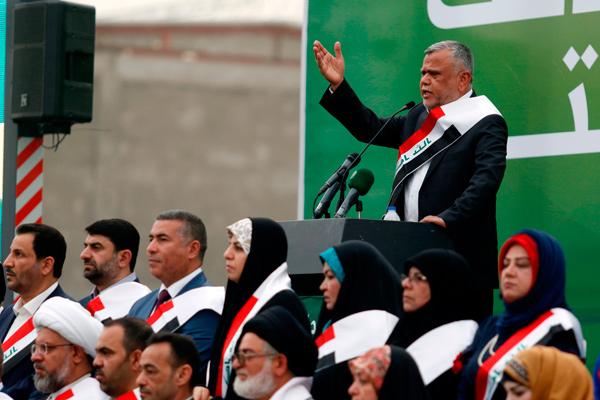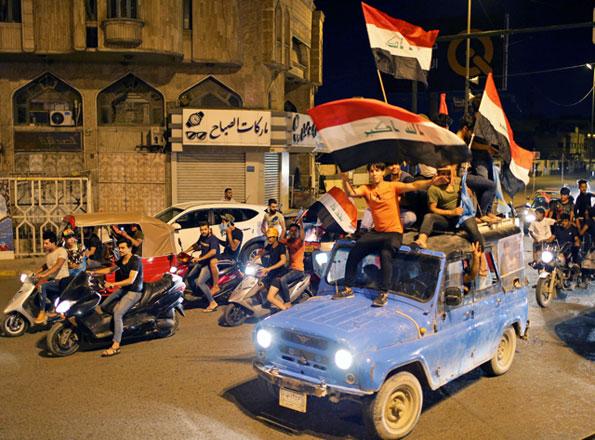You are here
Three Shiites lead field for Iraq election
By AFP - Apr 22,2018 - Last updated at Apr 22,2018

Hadi Al Ameri, head of the Badr organisation and leader of the mostly Shiite Hashed Al Shaabi paramilitary units, speaks during a campaign gathering in the city of Basra on Saturday (AFP photo)
BAGHDAD, Iraq — An incumbent prime minister, his ousted predecessor and a paramilitary chief instrumental in defeating the Daesh group are the three favourites vying for Iraq's premiership.
Since Sunni dictator Saddam Hussein was toppled in the US-led invasion of 2003, the constitution has vested key powers in the prime minister, a post reserved for the majority Shiite population.
Under a system of checks and balances designed to avoid a return to dictatorship, the winner of the May 12 parliamentary elections will have to form alliances with other Shiite, Sunni Arab and Kurdish lists to secure a majority.
Two of the favourites topping the lists were among the architects of victory against Daesh, which in 2014 seized a third of Iraq's territory in a lightning offensive.
The incumbent prime minister, 66-year-old Haider Al Abadi, took over the reins from Nuri Al Maliki in September 2014 at the high watermark of the security crisis.
The fightback which allowed Abadi to declare Iraq's victory over the militants in December, has silenced critics of his lack of military experience.
An engineering graduate and holder of a doctorate from the University of Manchester in Britain, Abadi is from the same Dawa Party as his predecessor Maliki.
He owes his position to the support of the marjaiya, the supreme council of Iraq's Shiite clerics, and to an international consensus.
"He is acceptable to all foreign stakeholders, from the Iranians, to the Americans [and] the Saudis," said Fanar Haddad, a senior research fellow at the National University of Singapore's Middle East Institute.
Military credentials key
As the official head of Iraq's military, Abadi has bolstered morale by drafting in foreign trainers, who have helped professionalise tens of thousands of soldiers.
Under his watch and backed by a US-led international coalition, the army has banished Daesh from all its urban strongholds in Iraq, leaving extremists largely confined to areas close to the Syrian border.
The Iraqi military has also pushed back the Kurds in the north's oil-rich Kirkuk province, bolstering Abadi's status as frontrunner going into the election.
"He has a popular base which transcends confessional and ethnic lines. He offers a narrative as a statesman and he is not tarnished by corruption," said Iraqi political scientist Essam Al Fili.
Haddad said: "Abadi remains the single strongest contender but not strong enough to win anything close to a majority."
His main contender is Hadi Al Ameri — a leader of Hashed Al Shaabi, a paramilitary network that played a pivotal role in defeating Daesh.
Ameri comes from Diyala province and is a statistics graduate from Baghdad University. He fled to Iran in 1980 after Saddam executed top Shiite cleric Ayatollah Mohammed Baqr Al Sadr.
The 64-year old is widely viewed as Tehran's favoured candidate.
He fought alongside Iranian forces in the Iran-Iraq war of 1980 to 1988 as part of the Badr organisation, and he only returned from exile after Saddam's ouster.
During Maliki's 2010-2014 term as premier, Ameri was a lawmaker and then transport minister, but he was blocked in a bid to head the interior ministry by an American veto.
The paramilitary chief ditched his civilian clothes in favour of military fatigues in 2014, to rally efforts against an ascendant Daesh.
At the battlefront, he operated alongside his old friend Qassem Soleimani, who runs the foreign operations wing of Iran's elite Revolutionary Guards.
‘Joker in the pack'
"I think Ameri will have a strong hand in the post-ballot negotiations but that government formation is likely to remain with Dawa and in all likelihood with Abadi," said Haddad.
Beyond Ameri's military credentials, his appeal has been bolstered by Hashed putting its bulldozers to work in rebuilding Basra and the capital's Sadr City district, exposing the state's deficiencies.
"With Dawa divided, I think Ameri sees himself as the joker in the pack, as a prime minister who can rebuild the civil state with the same success that he led the military," said Fili.
The third candidate, 68-year-old Maliki, has been chomping at the bit since he was forced out in 2014, after serving eight years as prime minister.
While still a prominent Dawa leader, he was accused of marginalising Sunnis and promoting corruption during his tenure.
"He is trying to focus his efforts on areas where the Dawa Party is strong and is attempting to get closer to Shiite armed groups to stay in the spotlight," said Fili.
For Haddad, the former premier's chances are modest.
"Maliki's fortunes have taken an irreversible hit. His second term is not remembered well by Iraqis in general."
"The upper limit of his prospects might be to play second fiddle to Ameri," Haddad said.
Related Articles
BAGHDAD — As fighting in Iraq raged last summer, Iranian Major-General Qassem Soleimani came across unexpected opposition to his plans
BAGHDAD, Iraq — Iran and its allies were mustering a bid Wednesday to limit the role of fiery Shiite cleric Moqtada Sadr in Iraq's next gove
Three months after he took office with a mission to unite his broken, warring country, Iraq's new prime minister has swept away the divisive legacy of his predecessor with a burst of rapid and dramatic measures.

















